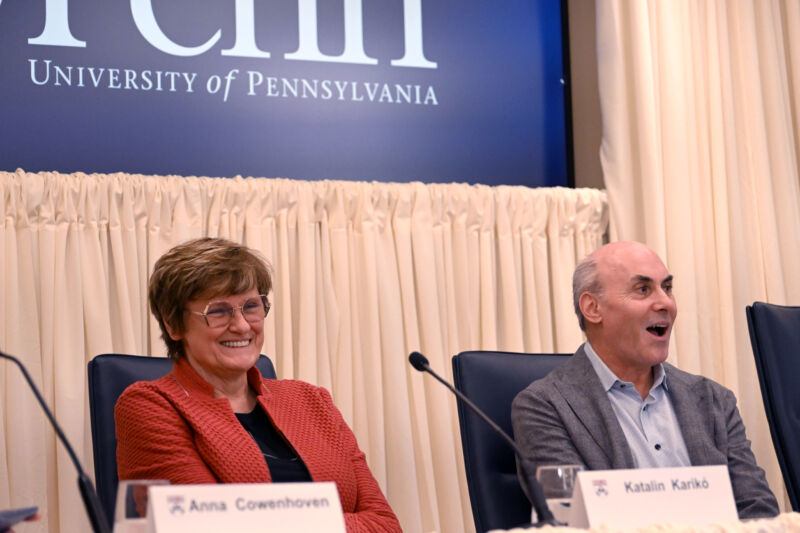Biochemist Katalin Karikó and immunologist Drew Weissman won the Nobel Prize in Physiology or Medicine Monday for their foundational research showing that chemical modifications to the molecular building blocks of messenger RNA (mRNA) could enable its use for therapeutics and vaccines—a realization crucial to the rapid development of the life-saving mRNA COVID-19 vaccines during the deadly pandemic.
The pair's prize-winning and tenacious work on different types of RNA culminated in a 2005 breakthrough study showing that chemical modifications of mRNA bases (nucleosides)—adenine (A), cytosine (C), uracil (U), and guanine (G)—could keep them from igniting innate immune responses and inflammation reactions, which had foiled previous efforts to use mRNA for therapeutics.
In our cells, mRNA is an intermediate molecule, a single-stranded copy of coding from the genes in our DNA blueprints that is then translated into functional proteins. (DNA uses bases A, C, G, and thymine (T), which is structurally similar to RNA's U.) The mRNA is copied (aka transcribed) from DNA in a cell's nucleus and then moves to the cytoplasm for its code-deciphering translation into proteins. Thus, mRNA is critical for protein production and is more accessible than DNA—features that made it an appealing target for developing therapeutics.
But, mRNA is considered unstable compared to DNA, and early work using synthetic strands of mRNA found it sparked inflammatory responses and led to only low levels of target proteins. This is where Karikó and Weissman's work came in.
mRNA toiling
Karikó had long been interested in using mRNA for therapies. After receiving her PhD at Hungary's Szeged University in 1982, Karikó did two post-doctoral research stints in the US before landing a tenure-track professor position at the University of Pennsylvania in 1989. There, she began experimenting with different types of RNA but with little success. She could not win scientific grants to fund her work and, in 1995, after years of toiling, her bosses at UPenn gave her the choice of either leaving or getting demoted. She chose the demotion.
In 1997, Weissman joined UPenn and, with his funding, the two began collaborating on mRNA research. Weissman, an immunologist, was interested in developing a vaccine against HIV and had been focusing on priming immune responses with dendritic cells—an immune cell with the main function of presenting bits of foreign substances (antigens) to T cells to train immune responses against those antigens.
Together, the two realized that synthetic (un-modified) mRNA triggered the dendritic cells to activate inflammatory responses. The finding led them down the path of realizing that RNA in mammalian cells was frequently chemically modified, while DNA and RNA from bacteria and viruses were frequently unmodified. Around the same time, other researchers found evidence that some key proteins that regulate inflammation—toll-like receptors (TLRs)—specifically detect modifications on DNA and RNA to trigger inflammation responses. TLRs are known for recognizing molecular patterns that uniquely identify pathogens.
In their breakthrough 2005 paper, Karikó and Weissman showed that synthetic RNA activates several TLRs, leading to inflammation responses. And, crucially, adding modifications to the bases in the synthetic mRNA—specifically, pseudouridine (Ψ), 5-methylcytidine (m5C), N6-methyladenosine (m6A), 5-methyluridine (m5U) or 2-thiouridine (s2U)—suppressed the inflammation responses. They subsequently showed the modifications could also improve protein production.
Kicked off and kicked out
The finding kicked off the field of mRNA therapeutics and spurred the formation of both Moderna and BioNTech, the two companies that would go on to develop lifesaving mRNA vaccines against COVID-19. Today, m1 Ψ is the most common modified base used in mRNA vaccine production and is present in Moderna and Pfizer-BioNTech's vaccines.
However, the finding received little fanfare among much of the scientific community at the time, and Karikó's research and contribution continued to go largely unappreciated before the pandemic. In 2013, Karikó said she was forced to leave UPenn.
"Ten years ago, I was here in October, because I was kicked out from Penn, was forced to retire," she said in an early morning interview Monday with the Nobel Assembly. She went on to work with BioNTech, doing hands-on benchwork. She became vice president and later senior vice president there. Since 2021, she went back to being a professor, working at Szeged University and as adjunct faculty at UPenn.
Weissman is also still at UPenn, as the Roberts Family professor in vaccine research and director of the Penn Institute for RNA Innovations.



3175x175(CURRENT).thumb.jpg.b05acc060982b36f5891ba728e6d953c.jpg)

Recommended Comments
Join the conversation
You can post now and register later. If you have an account, sign in now to post with your account.
Note: Your post will require moderator approval before it will be visible.